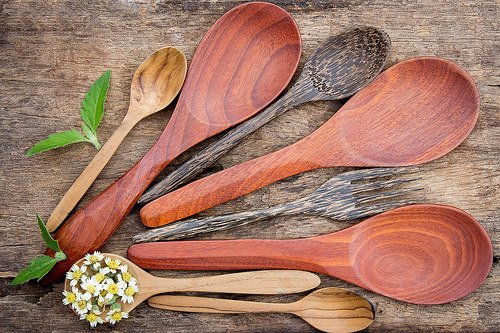Dipping your toe into the cooking pond may seem a bit intimidating, but our tips for new chefs will make it much more approachable. We’ll share how to set up a kitchen, some basic cooking vocabulary, stocking a pantry, and general food safety guidelines. Armed with these tools, you’ll be ready to tackle almost any kitchen challenge.

How To Set Up A Kitchen
There are a million culinary gadgets out there, but do not fret; you don’t actually need a lot of stuff to properly outfit a kitchen. We suggest some must-haves, like:
- set of knives (or at least Chef’s knife, serrated knife, paring knife)
- measuring spoons and cups (for dry ingredients)
- measuring cup (for wet ingredients)
- two cutting boards (one for meat and one for everything else)
- set of a few wooden spoons
- can opener
- small metal spatula
- metal slotted spoon
- dutch oven
- meat thermometer
- medium saucepan with lid
- small nonstick skillet
- large pot (for soup or pasta)
- food processor
- colander (strainer)
These are nice to have after you possess the top section:
- whisk
- peeler
- citrus juicer
- cheese grater
- tongs
- zester
- microwave-safe set of mixing bowls
- medium skillet with lid
- fine mesh strainer
- glass baking dish (9×13)
- roasting rack with pan
Reminder: You don’t have to run out and buy all of these items today; slowly collect them over time, paying attention to quality so you can use the same piece for years. You may already even have some of them in your kitchen, so don’t be intimidated. These tools can set you up for some amazing at home recipes.

Cooking Vocabulary
All the pots and pans in the world won’t help you cook if you can’t comprehend the directions in a recipe. So, we’d love to share a handful of useful culinary jargon we’ve picked up over the years. Read on for our terrific ten terms you can’t cook without!
- Dice – to cut into very small cubes
- Saute – to cook in a small amount of fat (like butter or oil)
- Toss – to mix ingredients gently without mashing them
- Julienne – aka French cut, to cut into long thing strips
- Garnish – a final step to adorn food for visual appeal
- Al Dente – Italian word for pasta cooked lightly until it is firm to the bite
- Dredge – to sprinkle with a light dusting of flour
- Pare – to remove the outermost skin of a veggie or fruit
- Reduce – to boil down to reduce the volume
- Pinch – the small amount of spice you can hold between thumb and forefinger

LightField Studios/Shutterstock
Stocking A Pantry
Now that you have a grasp of some basic cooking terms, and the tools you need in your starter kitchen, it’s time to tackle the pantry. It’s best to start with some common ground herbs and spices to begin your kitchen journey. We like:
- Himalayan pink sea salt
- black pepper
- oregano
- basil
- thyme
- cinnamon
- rosemary
- paprika
- garlic powder
- onion powder
- chili powder
- cumin
- fresh garlic cloves
It’s also good to invest in a couple high-quality fats, such as:
- a solid olive oil
- one high heat oil like coconut oil
- butter
To round out your pantry it’s helpful to get a few more staples you’ll find in a lot of recipes:
- chicken stock
- canned vegetables
- fresh onions
- all-purpose flour
- fresh lemon

Food Safety
A less exciting but no less important part about learning to cook is learning to cook safely. Home cooks should know the proper temperatures meat needs to reach to be safely consumed. Learn those here:
- Beef – 145 degrees
- Pork – 145 degrees
- Chicken – 165 degrees
- Lamb – 145 degrees
It’s also wise to pay attention to consume by dates on perishable products, use two cutting boards to avoid cross-contamination, and wash hands before preparing food.

Tyler Olson/Shutterstock
Now What?
Now that you feel a bit more comfortable with cooking lingo, food safety, and have a stocked kitchen and pantry, how do you take the next step? Start with recipes classified as easy, and practice until you have a few go-to’s in each meal category.
Breakfast Recipes
- Perfectly Poached Eggs are a great way to master cooking eggs and can be smeared on toast, or on top of eggs benedict.
- Avocado Toast is a simple, healthy, and delicious way to start the day.
Lunch Recipes
- Cranberry Chicken Salad can be used on a sandwich or in lettuce wraps for a low carb version.
- Poke Bowls are an easy marinated meat and veggie combination that make a perfect midday meal.
Dinner Recipes
- Stuffed Bell Peppers look impressive but are actually easy and super tasty.
- Baked Salmon provides a wonderful introduction to seafood at home.
Side Dishes
- Hasselback Sweet Potatoes are another dish that looks super fancy but is quite simple.
- Artichoke Puree is an approachable way to tame the scary-looking artichoke, and is great paired with lamb!
Add in a couple snacks, a new ingredient here and there, and keep experimenting. If it’s something you enjoy, keep your eyes peeled for any local cooking classes to learn even more quickly, or to specialize in a certain type of cuisine. Just have fun with it, and your kitchen know-how will increase gradually and organically. Happy cooking!
